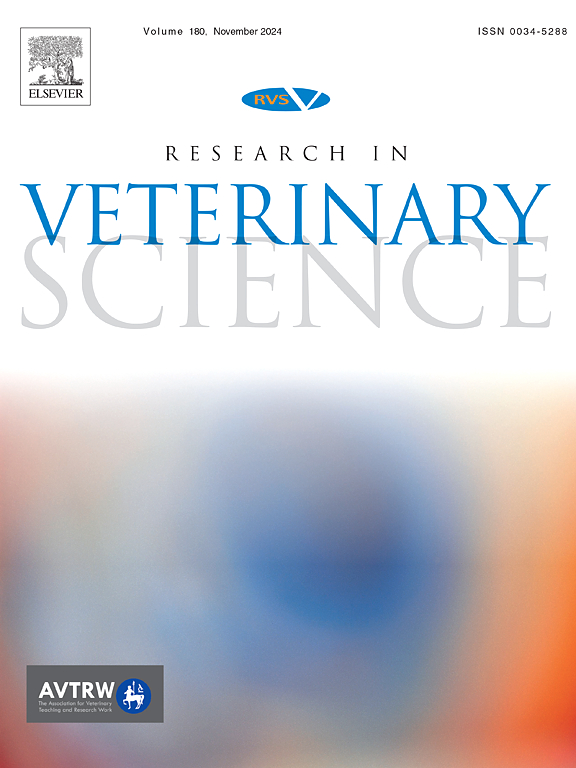Assessment of enflicoxib efficacy in the control of postoperative pain and inflammation in dogs undergoing orthopaedic surgery. A pilot randomised clinical trial
IF 1.8
3区 农林科学
Q1 VETERINARY SCIENCES
引用次数: 0
Abstract
Postoperative pain is most effectively managed pre-emptively and enflicoxib characteristics make it a good candidate to control it with a single administration. To assess the efficacy of enflicoxib in the control of postoperative pain and inflammation associated with orthopaedic surgery, twenty-eight dogs were randomised to receive 8 mg/kg enflicoxib (n = 14) orally the day before surgery, or 0.2 mg/kg meloxicam (n = 14) subcutaneously at induction and orally at 0.1 mg/kg daily every 24 h for seven days. Veterinarians assessed efficacy with the Glasgow Composite Pain Scale Short-Form (GCPS-SF) at 1.5, 3, 5, 8, 24 and 168 h after surgery. Visual analog scales (VAS) were also used to assess pain at rest, pain at palpation and inflammation. Enflicoxib showed to be non-inferior to meloxicam in the GCPS-SF total scores, at each time point, and the area under the curve (GCPS-SF AUC) for the first 24 h. No differences were observed in VAS scores at any time point after surgery or the global efficacy as assessed by the veterinarians, or the dog's wellbeing assessed by the owners. Enflicoxib administered 24 h before surgery is efficacious and safe for the control of postoperative pain associated with orthopaedic surgery. One single dose would control postoperative pain and inflammation for one whole week. The results need further confirmation in larger sample size studies.
恩氟昔布对骨科手术犬术后疼痛和炎症控制的疗效评价。一项先导随机临床试验
术后疼痛是最有效的预防措施,恩氟昔布的特点使其成为单次给药控制疼痛的良好选择。为了评估恩曲昔布对骨科手术术后疼痛和炎症的控制效果,28只狗随机分为两组,术前口服8 mg/kg恩曲昔布(n = 14),诱导时皮下注射0.2 mg/kg美洛昔康(n = 14),每24 h口服0.1 mg/kg,持续7天。兽医在手术后1.5、3、5、8、24和168小时用格拉斯哥复合疼痛量表(GCPS-SF)评估疗效。同时采用视觉模拟量表(VAS)评估静息痛、触诊痛和炎症反应。恩氟昔布在每个时间点的GCPS-SF总分和前24小时的曲线下面积(GCPS-SF AUC)均不低于美洛昔康。手术后任何时间点的VAS评分、兽医评估的整体疗效或主人评估的狗的健康状况均无差异。术前24小时给予恩氟昔布对骨科手术术后疼痛的控制是有效和安全的。单次剂量可控制术后疼痛和炎症一整周。结果需要在更大样本量的研究中进一步证实。
本文章由计算机程序翻译,如有差异,请以英文原文为准。
求助全文
约1分钟内获得全文
求助全文
来源期刊

Research in veterinary science
农林科学-兽医学
CiteScore
4.40
自引率
4.20%
发文量
312
审稿时长
75 days
期刊介绍:
Research in Veterinary Science is an International multi-disciplinary journal publishing original articles, reviews and short communications of a high scientific and ethical standard in all aspects of veterinary and biomedical research.
The primary aim of the journal is to inform veterinary and biomedical scientists of significant advances in veterinary and related research through prompt publication and dissemination. Secondly, the journal aims to provide a general multi-disciplinary forum for discussion and debate of news and issues concerning veterinary science. Thirdly, to promote the dissemination of knowledge to a broader range of professions, globally.
High quality papers on all species of animals are considered, particularly those considered to be of high scientific importance and originality, and with interdisciplinary interest. The journal encourages papers providing results that have clear implications for understanding disease pathogenesis and for the development of control measures or treatments, as well as those dealing with a comparative biomedical approach, which represents a substantial improvement to animal and human health.
Studies without a robust scientific hypothesis or that are preliminary, or of weak originality, as well as negative results, are not appropriate for the journal. Furthermore, observational approaches, case studies or field reports lacking an advancement in general knowledge do not fall within the scope of the journal.
 求助内容:
求助内容: 应助结果提醒方式:
应助结果提醒方式:


